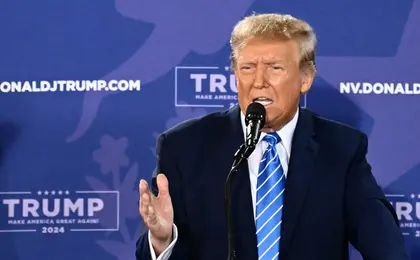It is a full nine months until the presidential election but Donald Trump is already wielding extraordinary influence as he seeks to bend US foreign policy to his ambitions of a return to the White House.
The Republican has been a private citizen since leaving office in 2021 but is running for reelection and urging his party to reject a bill tying the toughest border security measures in a generation to $60 billion in Ukraine aid.
JOIN US ON TELEGRAM
Follow our coverage of the war on the @Kyivpost_official.
“Don’t be STUPID!!! We need a separate Border and Immigration Bill. It should not be tied to foreign aid in any way, shape, or form!” Trump, who looks almost certain to be facing President Joe Biden again in November, posted on social media.
Biden and Trump offer starkly divergent approaches to Ukraine, with the Democrat clear that helping the pro-Western ally repel Russia is vital to ensure a safer world while his predecessor pushes an isolationist, “America First” policy.
At home, Biden has pressed for a humane immigration policy but Republicans point to statistics showing migrant apprehensions reaching a record high of 302,000 in December, a surge Trump has been wielding as a major issue in the campaign.
The demand that military aid for Ukraine be tied to immigration reform came from Republicans in the first place, with Trump keen to equate the crisis at the border with chaos abroad that he repeatedly claims he would have averted.

Russian Citizens Launch Campaign to Find Loved Ones Behind Front Lines
- Iron grip -
On Sunday, senators unveiled a bipartisan $118 billion package of immigration restrictions that Biden has committed to signing into law. It is tied to a foreign aid package that includes $60 billion for Ukraine and $14 billion for Israel.
The deal provides $20 billion in new border funding and would be a major win for immigration hawks, as it is full of concessions that Democrats would normally have opposed.
“We don’t have enough agents. We don’t have enough folks. We don’t have enough judges. You don’t have enough folks here. We need help. Why won’t they give me the help?” a frustrated Biden said Monday when asked about the bill’s prospects.
But Trump has an iron grip on Republicans leading the House of Representatives, and has called repeatedly for the party to kill the legislation and deny Biden and his Democrats a political victory ahead of November’s election.
“This Bill is a great gift to the Democrats, and a Death Wish for The Republican Party,” Trump said Monday on his Truth Social website.
Some House Republicans in districts won by Biden have voiced concerns about walking away from the deal -- especially when the party plans to impeach Homeland Security Secretary Alejandro Mayorkas this week over the border crisis.
But Trump’s overwhelming victories in the early nominating contests in the Republican presidential primary have solidified support around his candidacy, with more than 150 members of Congress now endorsing him.
- ‘Existential fears’ -
The critical test for the bill will be its first procedural vote, expected on Wednesday, which will require support from 60 senators in a 100-member chamber that is almost evenly divided between the two parties.
Even if it gets over that hurdle, House Speaker Mike Johnson, who talks to Trump regularly, said the deal would be “dead on arrival” if it reaches the Republican-controlled lower chamber.
US Secretary of State Antony Blinken warned last week that Ukraine’s gains over two years of fighting were all in doubt without US approval of the $60 billion.
While Trump has focused his criticism on the domestic aspects of the bill, critics see his opposition as another example of the controversial billionaire placing his electoral ambitions above national security when it comes to Ukraine.
Trump was impeached in 2019 over his attempts to strongarm Kyiv into smearing Biden as the Republican withheld $400 million in vital military aid that had already been approved by Congress for the embattled ally.
The influential Eurasia Group think tank said in its forecast of security risks for 2024 that a Trump victory in November would “call into question the US commitment to NATO and likely spell the end of US support for Ukraine.”
“Both would send shockwaves through Europe’s fragile security landscape and trigger existential fears among Europeans,” it said, “especially on NATO’s eastern flank.”
You can also highlight the text and press Ctrl + Enter










